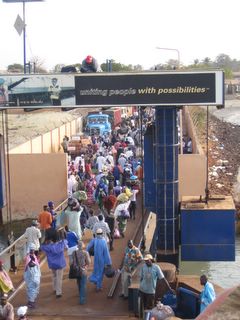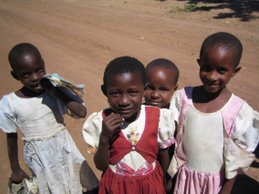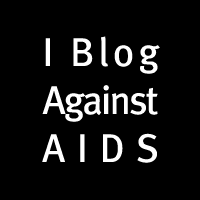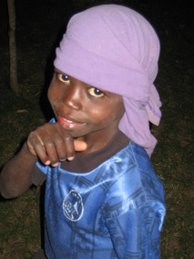Today is World AIDS Day
I'm sure at some point today you'll hear the stats (there are over 40 million people living with AIDS, most of them women, most of them in developing countries, most of them poor) and you'll think that's awful and move on with your life and not think about it too much. The numbers seem so huge you can't put a face on it and you probably think it can't happen to me.
I just spent about 6 months researching and writing about AIDS. A long the way I met Grace, a woman with eight children lying in a hospital ward in rural Tanzania. She told me her story in bits and pieces, her voice a whisper and stopping often, in obvious pain. She had come to the hospital a couple of years earlier for an operation on her stomach which had never healed. Grace had many children and was poor; she couldn't afford to come back to the hospital so suffered at home for a long time by herself. Finally her pain became so bad she had returned a few weeks earlier. She only ate when one of her children brought food as the hospital can't afford to feed the patients. Although she had been given drugs for her sores they hadn't healed and she felt the same as when she arrived. The doctors told me she had AIDS but didn't know: they hadn't told her and didn't seem to be in a hurry to do so. There was no way to treat her, so why tell her she was doomed to die?
I know a lot of you are thinking "but that's in Tanzania, it doesn't happen here," but actually, it does. HIV/AIDS happens everywhere, and the numbers affected are only increasing. Washington, DC has a higher HIV rate than Tanzania: the highest HIV rate in the US. 1 in 20 people in DC are HIV positive. It also has one of the worst records on treatment, and the highest AIDS mortality rate in the US. AIDS is the leading cause of death among young black women in DC.
Please take a moment today to think about the enormous impact the disease is having all over the world. Think of Grace, who will slowly get sicker and die, suffering needlessly because any drugs that could help her are scarce. Think of her eight children, who will watch their mother die slowly, then most likely their father. Think of the older girls, who will drop out of school (if they haven't already) to look after their siblings. Sex work may be the only way they can support the younger ones, increasing the chances they too will become sick and die. The family, already poor, will become destitute.
AIDS can happen to anyone at anytime. One of the reasons the disease is spreading so fast (and it is spreading all over the world) is because women are biologically, socially and economically at greater risk of HIV/AIDS. Traditional prevention efforts have ignored women's vulnerabilities and focused on techniques that require men's compliance, it's no wonder they have had little discernible effect.
Without treatment, millions of familes around the world will crumble, just like Grace's. Without treatment, there is no hope. Without hope there is no reason to be tested. Without getting tested, there is no way to prevent the spread of HIV/AIDS.
Debt relief, more effective aid, and fair trade will give developing countries funds to invest in HIV/AIDS interventions and fight poverty. Comprehensive and efficient health systems are vital for the poor to access treatment in developed countries. Governments will only support these measures if we, the average citizens, demand that they do so. Through protest, media and civil society action we must force our politicians to fully support effective prevention and treatment options for all, not just those that can afford to pay, and an end to the root cause of the spread of HIV/AIDS: poverty. We have the opportunity to stop the spread of AIDS: we must not let it slip away through inaction.
Please write to your legislators, your newspapers, or talk to your friends about what you can do to help. Think globally and locally: demand more AIDS funding, support local services and protect yourself. You can find some ideas to get you started here (US) and here (UK).
















